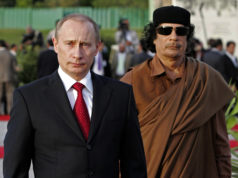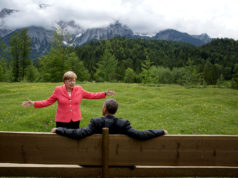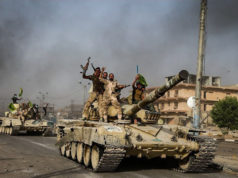The current crisis in Libya is far from over. The opposition is consolidating its position in Benghazi — Libya’s second largest city where the protests began — and they hold most of the eastern region of the country and much of the oil infrastructure. While army units that have defected back the opposition forces, their supply of weapons and ammunition is not limitless.
Qadhafi and his supporters remain in control of the capital, Tripoli, and several other nearby cities. Over the past 48 hours, Qadhafi’s forces tried to retake the cities of Zawiya, Misrata, and Zintan but so far the opposition has maintained their positions. What comes next will likely be a showdown and any battle for Benghazi would likely result in devastating casualties. If Qadhafi’s past behavior is any indication of his intentions, there will probably be swift executions for the soldiers who joined the opposition should the mad man of Tripoli prevail.
The question is: Will Muammar Qadhafi take the hint and step aside in the meantime? After all, the new UN Security Council sanctions were passed in record time (if measured by the glacial pace with which sanctions are typically passed in the UN), and referring the matter to the International Criminal Court (ICC) in The Hague should doubtlessly send the message that the world is aligned against Qadhafi.
Yet the ICC has yet to prove itself internationally; the Sudanese butcher, President Omar al-Bashir, has long been indicted but never apprehended. It is therefore unlikely that the ICC will influence Qadhafi’s decision-making. And Libya was already considered a pariah after the 1988 bombing of Pan AM flight 103 over Lockerbie, Scotland. It remained internationally isolated until UN sanctions were lifted in 2003, followed by the lifting of U.S. sanctions in 2004 in return for Libya eschewing its nuclear program and taking responsibility for the Pan AM bombing. Living again in isolation is far better than losing the country, Qadhafi will most likely conclude.
What then to make of Monday’s interviews with the Libyan leader? When asked about the demonstrations, Qadhafi told ABC’s Christiane Amanpour and the BBC’s Jeremy Bowen that no one stands against him and that he is beloved by the people. He further tried to explain that his interviewers did not understand the authority of the people and the system in Libya. He was not their president. Is this simply the ravings of a mad man?
Muammar Qadhafi may have taken leave of his senses some time ago, but the West also does not understand politics in Libya. Qadhafi has never taken an official title and in the past he has frequently reasserted the claim that it is the people who rule the state, not him. Muammar has been called the colonel, the thinker, the brother, the leader, but the phrase “the president of the state” has never been used. He also insists on the “Authority of the People” (sultat al-sha’b) where every Libyan citizen is considered a ruler, which is a concept that dates back to the 1970s. He has therefore reiterated on numerous occasions — before the recent events — that Libya has no opposition. After all, he would claim, it is illogical for people to revolt against themselves. In this sense, Muammar Qadhafi is living in a dream world of his own making, instead blaming the uprisings on al-Qaeda and those taking hallucinogenic drugs.
It is important to note that the U.S. relationship with Libya is far different from that of Egypt. The U.S. had decades of military contacts with Egypt and was able to impress upon the officers the need for Mubarak to step aside. No such contacts currently exist within Libya.
Looking forward, two things may affect Qadhafi’s calculus. The first would be the threat of force, including a U.S.-led or NATO-led imposition of a no-fly zone that would protect the opposition forces. To that end, the recent repositioning of U.S. ships and aircraft closer to Libya can be seen as a step in the right direction. But the question of how long Qadhafi remains in power will largely be one of how long his military commanders and those around him continue to carry out his orders. Without one or both, the mad man of Tripoli is unlikely to step down soon.





